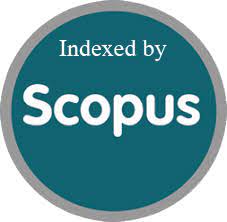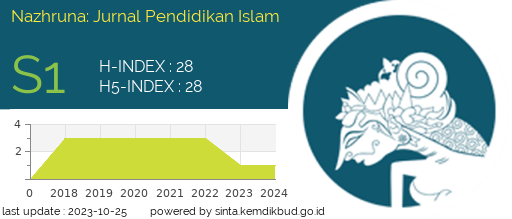The Process of Curriculum Innovation: Dimensions, Models, Stages, and Affecting Factors
Abstract
This article aims to explain the dimensions, models, stages, and affecting factors in the curriculum innovation process. Curriculum becomes very important in educational institutions because the curriculum is the "heart" of education. This research uses a descriptive qualitative approach with library research methods, using synthesis and content analysis. The results showed that the curriculum is a set of tools to achieve a goal, ranging from planning, and implementation to evaluation. Innovation or curriculum renewal needs to be done because education practitioners must adjust to the development of a society that is always changing and continues to grow. Innovations appear to answer critical issues in education. There are two models of innovation processes: the individual and the organizational models. Effecting factors in the curriculum innovation process are the vision-mission of education, population growth, the development of science-technology, and the relevant educational demands. Innovation must be the result of original and creative thinking. The application of innovation must be efficient, easy to use, and serves comfort for students, teachers, and practitioners of education.
Downloads
References
Alberty, Harold. Reorganizing The High School Curriculum. New York: The Macmillan Company, 1965.
Arifin, Zainal. Evaluasi Pembelajaran. Bandung: PT Remaja Rosdakarya, 2012.
Aydin, Hasan, Burhan Ozfidan, dan Douglas Carothers. “Meeting the Challenges of Curriculum and Instruction in School Settings in the United States.” Journal of Social Studies Education Research Sosyal Bilgiler Eğitimi Araştırmaları Dergisi 8, no. 3 (2017): 76–92.
Beane., J. A., C.F Toepfer, dan S.J Alessi. Curriculum Planning and Development. Boston: Allyn and Bacon, 1986.
Carl, A.E. Teacher Empowerment through Curriculum Development: Theory into Practice. 3rd ed. Cape Town, South Africa: Juta and Company, 2009.
Cowie, Bronwen, dan Beverley Cooper. “Exploring the Challenge of Developing Student Teacher Data Literacy.” Assessment in Education: Principles, Policy and Practice 24, no. 2 (2017): 147–63. https://doi.org/10.1080/0969594X.2016.1225668.
Dalin, P. Limits to Educational Change. New York: St. Martin’s Press, 1978.
Doll, Ronald C. Curriculum Improvement : Decision Making and Process. University of Michigan: Allyn and Bacon, 1992.
Dusenbury, Linda, Rosalind Brannigan, Mathea Falco, dan William B. Hansen. “A Review of Research on Fidelity of Implementation: Implications for Drug Abuse Prevention in School Settings.” Health Education Research 18, no. 2 (2013): 237–56. https://doi.org/10.1093/HER/18.2.237.
Frinch, Curtis R, dan Cruncilton Jhon R. Curriculum Development in Vocational and Technical Education. Boston and London: Allyn and Bacon, 1993.
Geissdoerfer, Martin, Paulo Savaget, dan Steve Evans. “The Cambridge Business Model Innovation Process.” Procedia Manufacturing 8, no. 1 (2017): 262–69. https://doi.org/. https://doi.org/10.1016/J.PROMFG.2017.02.033.
Hart, Chris. “Doing a Literature Review: Releasing the Research Imagination.” Journal of Perioperative Practice 28, no. 12 (2018): 318–28.
Hasan, Hamid. Evaluasi Kurikulum. Bandung: PT Remaja Rosdakarya, 2021.
Hasbullah. Dasar-Dasar Ilmu Pendidikan. Jakarta: PT Raja Grafindo Persada, 2001.
Hoydalsvik, Erika Lillemark. “Co-Operation Is Not Enough: Teacher Educators as Curriculum Developers in Times of Change.” International Journal of Higher Education 6, no. 5 (2017): 76–87. https://doi.org/10.5430/ijhe.v6n5p76.
Jacobs, Jennifer, Rebecca W Burns, dan Diane Yendol-Hoppey. “The Inequitable Influence That Varying Accountability Contexts in the United States Have on Teacher Professional Development.” Professional Development in Education 41, no. 5 (2015): 849–72. https://doi.org/10.1080/19415257.2014.994657.
Johnson, Clasquin, dan Merry G. “Now and Then: Revisiting Early Childhood’ Reactions to curriculum Change.” South African Journal of Childhood Education 6, no. 1 (2016). https://doi.org/10.4102/sajce.
Khan, Mohammad Ayub, dan Laurie Smith Law. “An Integrative Approach to Curriculum Development in Higher Education in the USA: A Theoretical Framework.” International Education Studies 8, no. 3 (2015). https://doi.org/10.5539/ies.v8n3p66.
Klein, M.F. A Conceptual Framework for Curriculum Decision Making, In the Politics of Curriculum Decision Making. New York: Suny Press, 1991.
Mayasari, Annisa, Yuli Supriani, dan Opan Arifudin. “Implementasi Sistem Informasi Manajemen Akademik Berbasis Teknologi Informasi Dalam Meningkatkan Mutu Pelayanan Pembelajaran Di SMK.” JIIP-Jurnal Ilmiah Ilmu Pendidikan 4, no. 5 (2021).
Meliani, Fitri, Dindin Alawi, Yamin Mohamad, Muhibbin Syah, dan Mohamad Erihadiana. “Manajemen Digitalisasi Kurikulum Di SMP Islam Cendekia Cianjur Kata Kunci.” JIIP-Jurnal Ilmiah Ilmu Pendidikan 4, no. 7 (2021): 653–63. https://doi.org/10.54371/jiip.v4i7.328.
Meliani, Fitri, Nanat Fatah Natsir, dan Haryanti Erni. “Sumbangan Pemikiran Ian G. Barbour Mengenai Relasi Sains Dan Agama Terhadap Islamisasi Sains.” JIIP-Jurnal Ilmiah Ilmu Pendidikan 4, no. 7 (2021): 673–88. https://doi.org/10.54371/jiip.v4i7.331.
Meliani, Fitri, Euis Sunarti, dan Diah Krisnatuti. “Faktor Demografi, Konflik Kerja-Keluarga, dan Kepuasan Perkawinan Istri Bekerja.” Jurnal Ilmu Keluarga & Konsumen 7, no. 3 (2014): 133–42. https://doi.org/10.24156/jikk.2014.7.3.133.
Musthafa, Izzuddin, dan Fitri Meliani. “Penerapan Metode Pembelajaran Islam Klasik Al-Zarnuji Di Era Revolusi Industri 4.0.” JIIP-Jurnal Ilmiah Ilmu Pendidikan 4, no. 7 (2021): 654–67. https://doi.org/10.54371/jiip.v4i7.329.
Nhlapo, David Molise, dan Lokesh Maharajh Ramnath. “Engaging Foreign Curriculum Experts in Curriculum Design: A Case Study of Primary School Curriculum Change in Lesotho.” Universal Journal of Educational Research 5, no. 10 (2017): 1741–47. https://doi.org/10.13189/ujer.2017.051011.
Oliva, Peter F. Developing the Curriculum. New York: Harper Collins Publishers Inc, 1992.
Pratt, D. Curriculum Perspectives In Curriculum Planning: A Handbook for Professionals. Fort Worth, Texas: Harcourt Brace Jovanovich, Inc, 1994.
Psifidou, Irene. “Innovation in School Curriculum: The Shift to Learning Outcomes.” Procedia Social and Behavioral Sciences 1, no. 1 (2019): 2436–40. https://doi.org/10.1016/j.sbspro.2009.01.429.
Ramberg, Magnus R. “What Makes Reform Work? School-Based Conditions as Predictors of Teachers’ Changing Practice after a National Curriculum Reform.” International Education Studie 7, no. 6 (2014). https://doi.org/10.5539/ies.v7n6p46.
Rizal Muhammad, Al Hafiz, dan Fatah Fauziah. “Pengaruh Aplikasi Pembelajaran Dan Teori Behavioristik Terhadap Efektivitas Pembelajaran Siswa Jurusan Keagamaan.” Inovasi Kurikulum 19, no. 1 (2022): 54–68. https://ejournal.upi.edu/index.php/JIK.
Rogers, E.M. Diffusion of Innovation. New York: The Free Press, 2003.
———. Diffusion of Innovations. New York: The Free Press, 1962.
Rumahlatu, Dominggus, Estevanus K. Huliselana, dan Johanis Takariaa. “Analysis of the Readiness and Implementation of 2013 Curriculum in The West Part of Seram, Maluku Province, Indonesia.” International Journal of Environmental & Science Education 11, no. 12 (2016): 5662-75.
Rusdiana, A. Konsep Inovasi Pendidikan. Bandung: CV. Pustaka Setia, 2014.
Subandijah, Subandijah. Pengembangan Dan Inovasi Kurikulum. Jakarta: Raja Grafindo Persada, 1996.
Supriani, Yuli, Leo Kardi, dan Izzuddin Musthafa. “Kajian Deskriptif Kurikulum Islam Menurut Ali Ahmad Madkur.” JIIP-Jurnal Ilmiah Ilmu Pendidikan 4, no. 7 (2021).
Webb, Andrea S, Harry T Hubball, dan Meriem Mckenzie. “Strategic Approaches to Glocalising Curriculum Practice: Responding to Faculty Development Needs and Circumstances in Diverse University Contexts.” International Journal of Curriculum and Instruction 13, no. 2 (2021): 1209–25.
Zaltman, G, R Duncan, dan J. Holbeck. Innovation and Organizations. New York: Scientific Research Publishing, 1973. https://www.scirp.org/(S(351jmbntvnsjt1aadkposzje))/reference/ReferencesPapers.aspx?ReferenceID=1815795.
Copyright (c) 2022 Fitri Meliani Meliani, Yuli Supriani, Asep Supriyadi, Supiana Supiana, Qiqi Yuliati Zaqiah

This work is licensed under a Creative Commons Attribution-ShareAlike 4.0 International License.










1.jpg)


